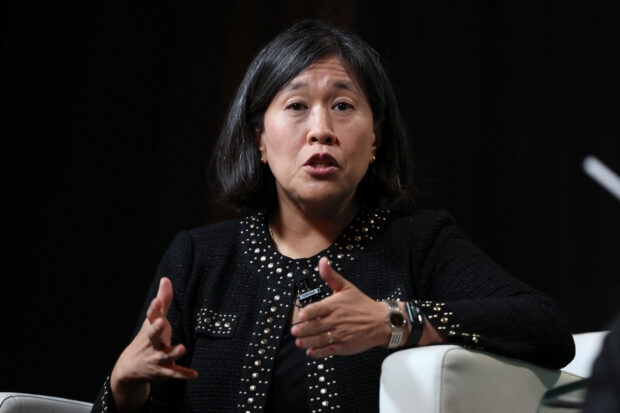
U.S. Trade Representative Katherine Tai speaks during the Axios BFD event in New York City, U.S., Oct 12, 2023. REUTERS/Brendan McDermid/File photo
ABU DHABI – U.S. Trade Representative Katherine Tai on Wednesday ruled out an agreement on World Trade Organization dispute settlement appeals reform this week but said WTO negotiations on the issue were positive and showing some progress.
Tai, speaking to reporters on the sidelines of the WTO‘s 13th ministerial conference in Abu Dhabi (MC13), said the dispute settlement negotiations would continue on “much harder issues” after the conference ends later this week.
The WTO‘s dispute settlement system has been hamstrung for years because the U.S. has blocked new judge appointments to the Appellate Body. Washington claims the body overreached its authority by effectively making new trade rules through litigation.
Dispute settlement system
The lack of an Appellate Body has left trade disputes worth billions of dollars unresolved and restoring its function was seen by many WTO members as a key goal for MC13.
READ: WTO conference: the main issues
Asked to describe the mood in the dispute settlement negotiating session, Tai said: “Positive. Collaborative. Constructive. Sober. We have more work to do.”
She said there was convergence among members on improving some aspects of the dispute settlement system as part of a process started a year ago that was “energizing” the membership to “think big” about broader WTO reforms to meet 21st century trade challenges.
Appeals reform issue
Tai pushed back against accusations that the U.S. stance on dispute settlement had brought the WTO to a standstill, but said that the appeals reform issue remained difficult.
“There is another set of issues that are going to be harder and take longer to address including what to do with this appeals mechanism and how to have a mechanism for review that doesn’t repeat the problems of the appellate body that came before it,” Tai said.
READ: World Trade Organization’s push for reform plagued by obstacles
“We are looking forward to continuing this process after MC 13 and really tackling the much harder issues.”
Asked what overall success for MC13 would look like from the U.S. perspective, she said this would be “meaningful steps forward in reforming the WTO” in documents on Thursday or Friday and maintaining positive momentum at the organization.
Tai went into the conference with expectations of “pragmatic” incremental steps toward WTO reform.